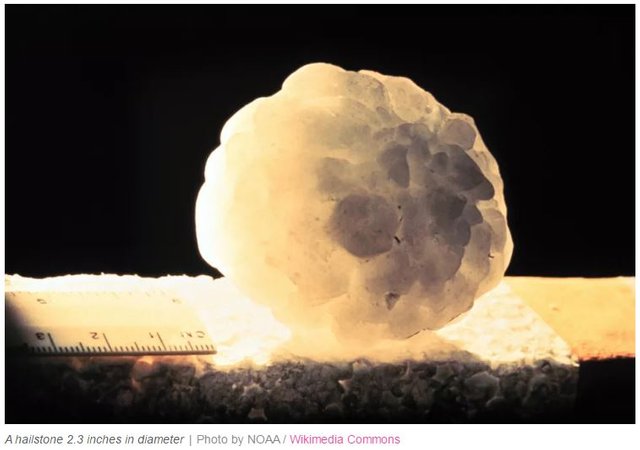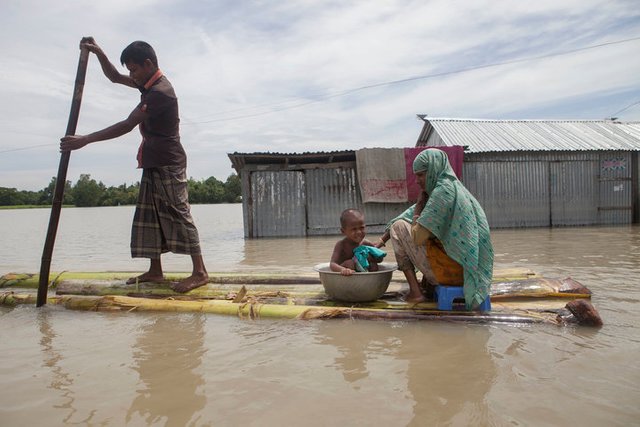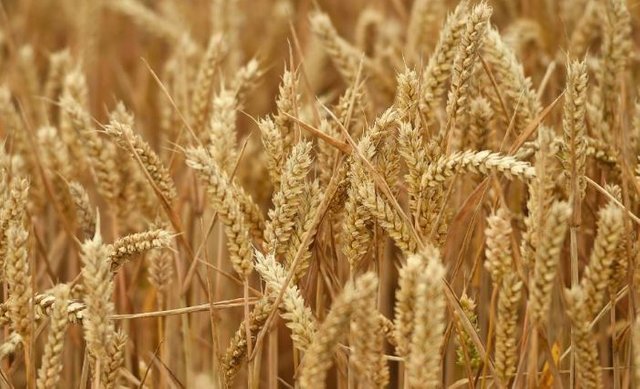Top news and views about Environment and Cleantech for 29 Jun 2017
(Tip: To open the tweet in a new window 'Right-Click' the 'Tweet This Story' text and 'Open link in new tab')
World food supplies at risk as climate change threatens international trade, warn experts

The world’s food supplies are in danger as climate change and the increasing reliance on global trade threaten to create shortages and sudden, dramatic increases in prices, according to a new report by the leading think tank Chatham House.
The report’s authors warned of a “growing risk … to human security” with the potential for “systemic disruption” and so-called Black Swan events – major unexpected changes.
They called for an international “emergency response mechanism” to be created to help deal with crises as they arise and an increase in emergency food stocks.
Urgent action should also be taken to improve “weak and ageing” infrastructure in major crop-producing regions such as Russia, Ukraine and the US, the report added.
Full story at http://ind.pn/2tl2I9Z
Emma Thompson on new film Alone in Berlin, global warming and getting out of her comfort zone

Emma Thompson can still remember a request from her mother – and sometime co-star – actress Phyllida Law: “Please don’t play another good woman in a frock!’” Thompson has, to be fair, made a respectable career out of this particular period drama archetype. Films like Merchant Ivory’s The Remains of the Day and Howard’s End, for which she won an Oscar and a Bafta as Margaret Schlegel, and Ang Lee’s Sense and Sensibility, which gained her a second Academy Award for adapting Jane Austen’s novel.
Yet there’s a great deal more to Thompson’s career than frocks (as well as turns in Harry Potter, Nanny McPhee and assorted Richard Curtis movies). Mike Nichols’ Primary Colors springs to mind, in which she played the wife of John Travolta’s Democratic Governor (a film inspired by Bill Clinton’s first presidential campaign). She took a risk too in Christopher Hampton’s Imagining Argentina, the story of a couple living under a dictatorship (“yeah, we got slaughtered!” says Thompson, wincing at the memory of scathing reviews).
Now comes Alone In Berlin, actor-turned-director Vincent Pérez’s adaptation of the 1947 novel by Hans Fallada, based on the lives of Otto and Elise Hampel, a working class German couple that secretly wrote and distributed anti-Nazi party postcards around Berlin during World War II. Starring opposite Brendan Gleeson, Thompson plays Elise’s fictionalised counterpart, Anna Quangel. “Sometimes, something comes along that has really a great depth and breadth of purpose,” she says. “Those are the jobs that you live for as an artist. This was one of those.”
Full story at http://ind.pn/2tl9zjF
Bigger hail might pummel the US as climate change gathers more force

Last month, hailstones as big as baseballs pounded the Denver area, knocking down power lines, damaging homes, and smashing through windshields “like tissue paper,” TheWashington Post reported. The hailstorm hit during rush hour, when lots of cars where on the road, and ended up being Colorado’s costliest catastrophe, totaling $1.4 billion in damages. But if climate change goes unchecked, we might see more of these extreme hailstorms in the future, according to new research.
A study published today in Nature Climate Change shows that in the second half of this century, North America could experience fewer hail days overall, but storms with larger hail might become more common, including hail that’s larger than 1.6 inches — exactly like the hailstorm that plummeted Denver. This is bad news across the board: hail can destroy crops, as well as homes and cars, leading to more insurance losses.
Predicting how hail will change due to global warming is very complicated. Hail forms during thunderstorms, when fast air currents carry water droplets up in the sky, where they freeze into hailstones. As more water freezes around them, these lumps of ice become too heavy and fall onto the ground as hail. Predicting such small-scale events is difficult. In this study, researchers used several models to simulate how hail might form and grow over North America between 2041 and 2070, if the world keeps warming up.
They found that while hail days in the summer and spring might decrease overall, storms with large hail — 0.4 to 1.6 inches — might become more common, especially in the central and northern plains of the US. Areas like eastern Colorado, Nebraska, and southern South Dakota might see an increase in hail that’s larger than 1.6 inches, the study says. Southeastern states like Florida, instead, could be lucky: they might experience fewer hailstorms and with smaller hail.
Full story at http://bit.ly/2tkY6kh
Prime minister Modi could lecture Trump on climate change — India is leapfrogging the US on renewables

India's prime minister Narendra Modi is meeting with President Donald Trump on Monday, and the agenda could include climate change as the two prepare for the G-20 Summit in July.
In the wake of Trump's withdrawal from the Paris climate agreement, Modi might have a thing or two to lecture the American president about. India is leapfrogging the US with ambitious renewable energy goals - and it's achieving them.
Following the US' departure from the Paris accord, countries like India, China, and the EU have "stepped up to fill the void the US left behind" John Coequyt, the Sierra Club's global climate policy director, told Business Insider on Monday.
India wants to get nearly 60% of its energy from non-fossil fuel sources by 2027, and the country is on track to exceed the goals it set in its commitment to the Paris deal.
Full story at http://read.bi/2tkU23t
Climate Change Could Threaten Up To 2 Billion Refugees By 2100

Charles Geisler, a sociologist at Cornell University, spent much of his career researching where poor people go when rich corporations swoop in and buy the land out from under their feet.
But his focus began to shift in 2005, after observing how storm surges tainted farmland in Bangladesh with salt water. Later that year, Hurricane Katrina struck New Orleans, submerging communities once believed to be safe behind levees and dikes. As floodwaters inundated Vietnam’s Mekong Delta last year, Geisler’s new worldview came into sharp relief.
The rising sea, he surmised, is the one displacement force more powerful than greed.
Geisler began collating climate and demographic research, and came to a dire conclusion: By the year 2100, rising sea levels could force up to 2 billion people inland, creating a refugee crisis among one-fifth of the world’s population.
Full story at http://bit.ly/2tl1aN6
Climate change could prevent food getting around the world

Climate change is bad news for basically every facet of human existence and now it's set to literally hit us in the gut by threatening global food supplies. According to a new report by leading think tank Chatham House, global warming is on course to produce more violent storms and increased flooding, affecting both crop yields and global trade routes.
The report, Chokepoints and Vulnerabilities in Global Food Trade, explains that while volatile weather will have a clear and direct impact on crops it will also affect important trade routes, restricting the global free flow of food on which we depend.
According to the report, international trade has allowed certain regions to specialise in particular types of food production, thereby boosting productivity and reducing costs.
But this system is now "coming under increasing strain", and the report's authors have called for an "emergency response mechanism" to deal with the growing risk of dwindling global food supplies.
Full story at http://engt.co/2s2ABst
Prepared by @SydesJokes
Original post from: http://Blog.CrowdifyClub.com/
Check the "Crowdify CleanTech"Facebook Group: https://www.facebook.com/groups/108785324695/
Hi! I am a robot. I just upvoted you! I found similar content that readers might be interested in:
https://www.intellinews.org/united-kingdom/the-independent/2017/06/27/emma-thompson-on-new-film-alone-in-berlin-global-warming-and-getting-out-of-her-comfort-zone/
Hey, I'm not a robot, but I upvoted you and resteemed!
Very interesing liked your blog. This affects us all.